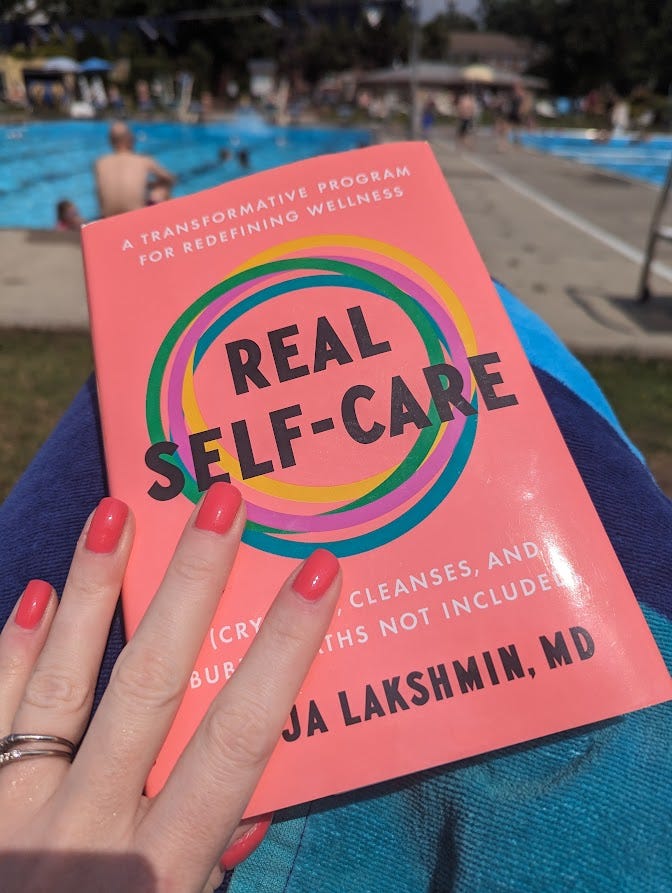no one's going to give you permission
Real Self-Care for your writing life + setting intentions for July
Welcome to Write More! This is the monthly intentions email, which goes out the last Sunday before a new month starts.
If you’d like to join us, subscribe here.
Advice columns are one of my guilty pleasures. And there’s one particular column, from last September, I keep thinking about. In that column, a dad wrote in to Slate’s Care and Feeding to describe a conflict he and his wife were having about their kid’s after school schedule. The dad works 7-3, so the kid had been going to aftercare at a community center for the 45 minutes or so it took the dad to wrap up work and pick him up. But the kid loved aftercare and asked if he could stay longer, and so the dad had started leaving the kid until 4.30 or 5 and using that extra bit of time to exercise or just decompress after work. By the time mom got home at 6, the kid had had time with friends and finished his homework, and the dad had dinner ready.
Sounds good, right? The kid was happy, dad was happy, but mom was enraged. She wanted the dad to pick the kid up as soon as he’d done with work, then plan his own activities to keep the kid busy. It’s unfair, she said, that he’d get two hours after work to “check out of parenting” while she had to rush right home to her family after work. (The dad suggested she take some time for herself after work, but she refused.)
And it’s that mom I keep thinking about.
I can hear how angry she is, and how hard she’s trying to do all these impossible things: work a long day at a job she probably doesn’t like much, spend time with her kid, keep the rest of her life somewhat together. She’s not wrong that it sucks. I’ve been that mother, with the rage just rippling off me.
But here’s where I keep getting stuck: the mom insists that “a mother would never be able to get away with” leaving her kid at aftercare for more time than was absolutely required by her job. And maybe there is a stranger with a scorecard somewhere, marking off your devotion to your kid as measured by how few moments you take to yourself and how quickly you run from work to school pickup. Or maybe your own mom or your neighbors or some jerk parents at school might judge you for leaving your kid at aftercare for longer than is strictly required. But: who cares? Even if all that judgment is real (and I think most people are far too busy trying to keep their own shit together to know what time you get off work or what your kid’s doing while you’re at Target), it doesn’t have to matter to you. And what definitely isn’t real is the idea that someone is going to descend and give you a Good Mom stamp that will make all your anxieties and guilt go away.
In your real life and your writing life, waiting for someone else to give you permission, worrying about what you can get away—that’s a recipe for just becoming a ball of rage. In other words: you can get away with whatever you want.1
How much freer would you be in your writing life if you started there? What would you write, what would you pitch, how big would your dreams be if you started out with the knowledge that no one’s going to give you permission—so you might as well just take it.
I’ve been thinking about this idea of permission and judgment as I work my way through the drafts of the first three chapters of my new book, The Good Mother Myth. The writing has been so, so hard, guys. This is not my first book, but it’s a very different of book than I’ve written before, and there’s such an enormous volume of research, and I’m braiding that research alongside memoir. It’s a lot!
One thing that’s been really helpful in the last week or so is the book Real Self-Care: A Transformative Program for Redefining Wellness (Crystals, Cleanses, and Bubble Baths Not Included) by
. (I’d read about it tons of places, but, for the record, it was her interview with , where she explained that “my critique is structural, and my ‘solution’ is personal, not commercial” that convinced me to buy it.)
The chapter that really spoke to me was on self-compassion. One big takeaway that feels relevant to writing: how you talk to yourself matters, and being mean to yourself actually makes your work harder. Pooja, who nicknamed her inner critic Angelica, after the bossy Rugrats character, gave an example from her own writing process that resonated with me:
For example, when Angelica of Rugrats infamy was berating me for not getting more writing done, the last thing I wanted to do was sit down and write about real self-care. Not only did I feel like a hypocrite, I also couldn’t hear myself think clearly. Paradoxically, when I gave myself permission to take the night off, go for a walk, or listen to my favorite podcast episode, I felt inspired to write.
So as you think about your hopes for your writing life in the coming month, you might start by thinking about self-compassion. (This Hidden Brain interview with psychologist Kristin Neff is a great resource, if you want to learn more about the power of self-compassion.)
July intentions
As you reflect on June and set intentions for your writing life in July, two questions, with a special eye toward self-compassion:
Where can you be kinder to yourself?
How can you ask for help?
And a bonus question: what you have done in the past that’s helped and that might be worth trying again?
Two quick reflections of my own that I’ll share:
In my efforts to be kinder to myself as I finish this chapter draft, I was reminded of a section from Annie Dillard’s The Writing Life that feels like a helpful reframe:
Putting a book together is interesting and exhilarating. It is sufficiently difficult and complex that it engages all your intelligence. It is life at its most free. Your freedom as a writer is not freedom of expression in the sense of wild blurting; you may not let rip. It is life at its most free, if you are fortunate enough to be able to try it, because you select your materials, invent your task, pace yourself.
So it’s not that I’m dumb or the book is too hard to write. It’s interesting and exhilarating. It engages all my intelligence. (Or, as one of my favorite barre instructors reminded us recently, this is supposed to be hard.)
I remembered recently that for a while I was really into finding a one-hour loop of a song I liked and letting it kind of hypnotize me during a writing session. So this week, I’ve been listening to “Mermaids” by Florence & the Machine on repeat. It’s a weird song (the mermaids have sharp teeth?) but, as Samantha Irby says, I like it.
elsewhere on the internet
I talked with Meredith Chamberlain at the
newsletter about the wild mess of summer childcare. (It’s a great newsletter!)The letters in this year’s #1000wordsofsummer have been truly so excellent, and I especially loved Sarah Thankam Mathews’s letter for its many practical tips for “tricking our stupid brains” into writing.
If you want to grab a copy of The Long Devotion: Poets Writing Motherhood, you can get it for 50% off from now through June 30, using code 08SALE, when you buy it from UGA!
Okay, one more from this year’s #1000wordsofsummer, Nicole Chung on being kind to ourselves in our writing practice:
I’m always thinking about how I can trust myself more, treat myself more humanely as I work. None of us are machines. We all deserve patience and care and time and rest. We deserve these things because we are human, not because they make us more productive or better at our jobs. But they can serve the work we want to do, too.
more good ideas, from the Write More archive
on embracing failure as part of the creative process, with an assist from Rosie Revere
your brilliant first flop
on risk and the idea that the bigger risk is not trying whatever thing feels scary to you
Write More, Be Less Careful is a newsletter about why writing is hard & how to do it anyway. I’d love to hear from you. Reply to this email, comment below, or find me on instagram (@nancy.o.reddy).
If you’ve enjoyed this newsletter, I’d love it if you would share it or send it to a friend.
To be clear, I’m not suggesting you, like, go do some crimes. I mean more in the sense of: ambition, audacity, even. For example, can I get away with a chunk about feminist research on baboons in a chapter on the origins of attachment theory? Who knows! (I like it.)







I really wanted to comment on this when I read it the day it was published and then again when I reread it, but time has been in short supply lately. This resonates so much for me, and I cannot wait to read your new book! Thank you.
This was so helpful! Really looking forward to your book!